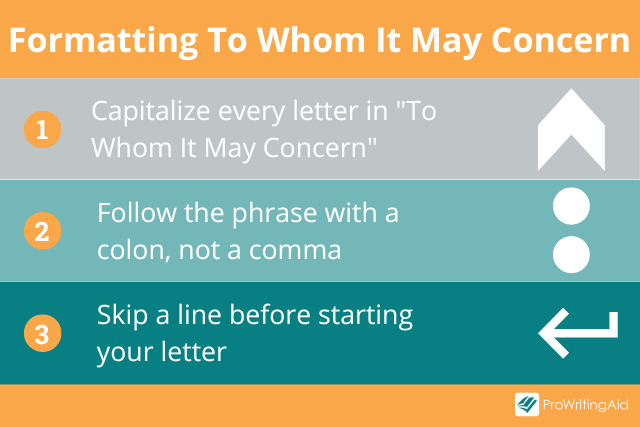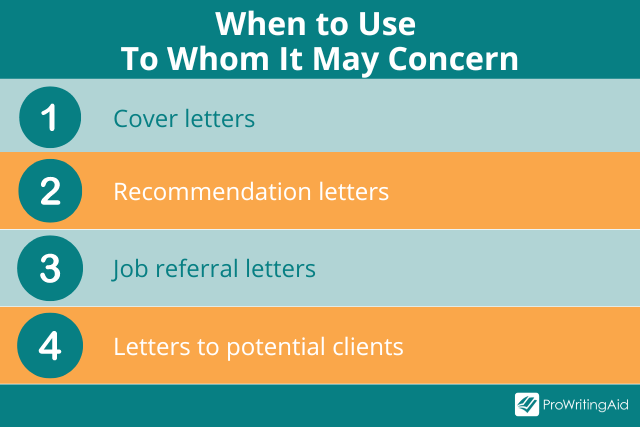
Whenever you write a professional letter or email, it’s important to start with the right salutation.
One common professional greeting is the phrase “To Whom It May Concern.” So what exactly does this phrase mean, and when is it appropriate to use it?
This article explains the meaning of “To Whom It May Concern,” offers some alternatives to consider, and gives you examples of this phrase in action.
To Whom It May Concern Definition
“To Whom It May Concern” is a greeting used at the beginning of a letter or email when the identity of the reader is unknown. It functions as a generic salutation that can be addressed to anybody reading the letter.
To Whom It May Concern Meaning
You can use “To Whom It May Concern” whenever you’re writing a letter and you don’t know who the recipient will be.
For example, you might use this greeting when you’re writing a cover letter for a job application and you don’t know the name of the person who will be reviewing your letter. It’s safer to write “To Whom It May Concern” than to address your letter to the wrong person.
Before the advent of the digital age, “To Whom It May Concern” was a common greeting in professional correspondence. It was a lot harder to look up the names of specific people at companies and organizations without access to the internet.
These days, however, it’s a lot easier to look up the name of the person you’re writing to, whether it’s a hiring manager, a prospective client, or the head of a department or committee. As a result, “To Whom It May Concern” has started to feel like a stuffy and old-fashioned phrase.
As a good rule of thumb, you should avoid writing “To Whom It May Concern” whenever you can use a more modern alternative.
How to Format “To Whom It May Concern”
It’s standard practice to capitalize the first letter of each word in the phrase “To Whom It May Concern.”
You should follow the phrase with a colon, rather than a comma.
The salutation of a letter should always have an entire line to itself. Then skip the next line and start the first paragraph of your letter on the line after that.

Is It Who, Whom, or Whomever It May Concern?
The correct phrase should always be “To Whom It May Concern,” not “To Who It May Concern” or “To Whomever It May Concern,” which are both grammatically incorrect.
To Who It May Concern
Who and whom are both pronouns, but they’re used in different ways. Who refers to the subject of a sentence, while whom refers to the object of a sentence.
In this case, consider the question: “Whom might this letter concern?” The subject of this question is the letter, while the object of this sentence is the person the letter concerns.
Because “To Whom It May Concern” refers to the object of the sentence (the reader), not the subject of the sentence (the letter), it is grammatically incorrect to use who instead of whom.
To Whomever It May Concern
Whomever and whom are both object pronouns, so they could both be acceptable in the sentence “Whom might this letter concern?”
However, “To Whom It May Concern” is a standard phrase that people are used to seeing, so using a new variation will look strange and unprofessional. As a result, it’s considered incorrect to use “To Whomever It May Concern.”
To Whom It May Concern Alternatives
If you don’t like the idea of using “To Whom It May Concern” at the beginning of your letters, you’re not alone. In many contexts, this phrase can feel overly formal or even outdated, so it’s becoming increasingly common to use synonyms instead.
Here are four common alternatives you can use instead.
1. “Dear/Hello/Hi [Name of Person You’re Addressing]”
It’s always better to address a letter to a specific person than to leave the greeting generic. Avoid the mistake of using “To Whom It May Concern” when you should already know whom your letter will concern.
Personalizing your letter for a single contact person proves you did your research and looked up who you’re writing to. It also shows that you respect the recipient of your letter enough to acknowledge them.
If you’re writing a cover letter, for example, you can comb through the job description to see who the role reports to. Many job descriptions include the name of either the hiring manager or the person who will be your future boss.
You can also check the company’s website to find the right name to use. Professional networking websites like LinkedIn can also provide you with the right name.
When all else fails, you can contact one of the company’s customer service representatives to ask if they’ll disclose the name of the hiring manager. Going the extra mile to personalize your letter will help you make a positive first impression right off the bat.
2. “Dear/Hello/Hi [Mr./Mrs./Ms./Dr./Professor] [Last Name]”
If you’re writing informally, it might be fine to address someone simply by their first name. If it’s a more formal letter, however, it might be safer to use that person’s title, followed by their last name.
However, this option can be risky. It’s important to be careful not to use the wrong title for the person you’re writing to.
You want to avoid calling someone “Mr.” or “Mrs.” if they prefer to go by “Dr.” You should also be careful to avoid misgendering the person you’re addressing, so try to avoid using gendered language without double-checking their preferences.
3. “Dear/Hello/Hi [Role of Person You’re Addressing]”
If you can’t find a name to address your letter to, you can use a job title or role instead.
For example, many job applicants start their cover letters with the phrase “Dear Recruiter,” “Dear Search Committee,“ “Dear Recruiting Department,“ “Dear Recruiting Manager,“ “Dear Hiring Manager,” or “Dear Hiring Team.”
If you’re writing to a customer service team, you can use “Dear Customer Service Manager“ or another equivalent.
If you’re writing to a team or a large group of people, you can use a simple “Hi team,” “Dear [name of the team],” “Hi all,” or “Hi everyone.”
If you’re writing to your network of contacts, you can even use “Dear Friends” or “Dear Friends and Family.“
4. “Hello/Hi There/Greetings”
In the twenty-first century, it’s becoming increasingly common to go with a simple salutation like “Hello,” “Hi there,” or “Greetings.” These are all friendlier, more casual ways to begin a letter or email.
This informal greeting will make your letter feel more personalized and modern than using “To Whom It May Concern.”

When to Write “To Whom It May Concern”
Here are four common situations where it’s appropriate to use “To Whom It May Concern.”
1. Cover Letter
Many job applications require you to write a cover letter explaining why you’re a good fit for the role.
Often, there are many people who read a cover letter: a recruiter, a hiring manager, the person the role reports to, and more. If you don’t know who exactly will be reviewing your cover letter, it’s standard to open your letter with “To Whom It May Concern” as a greeting to all potential readers.
As we mentioned earlier, you should always try to research the name of the person who will be reading your cover letter and address them by name if possible. “To Whom It May Concern” should be your last resort.
2. Recommendation Letter and 3. Referral Letter
If you work in an academic environment, a student might ask you to write them a recommendation letter for a job or school application.
In corporate settings, a colleague might ask you for a recommendation or referral to a different job opportunity.
Both of these situations might require you to address a letter to someone you don’t know, and it’s often hard to find the name or title of the person who will be reading your letter. In this scenario, it’s perfectly acceptable to use “To Whom It May Concern” instead of a more personal greeting.
4. Letter to a Prospective Client
If you’re in a client-facing role, you might have to contact potential clients to see if they are interested in your products or services.
When you’re reaching someone who makes decisions for an entire company, team, or organization, you might not know the name of the individual in charge until after they reply to your letter.
It’s reasonable to use “To Whom It May Concern” when writing to prospective clients whose names you don’t know. However, you should also consider using a more modern greeting, such as a simple “Hello.”

To Whom It May Concern Examples
Let’s look at some examples of how to use “To Whom It May Concern” in action.
Example 1: Cover Letter
To Whom It May Concern:
I am writing to express my interest in the summer internship program at [Company Name].
I learned about your company through the student career center at my school and through speaking to other students who have interned with your company. I am passionate about the work you do, and I believe that I could be a great fit for your team.
Example 2: Academic Recommendation Letter
To Whom It May Concern:
It is with much enthusiasm that I recommend [Student’s Name] for admission at your institution.
I have been [Student’s Name]’s English instructor for the past two years. She has been a wonderful participant in my classes, and she has demonstrated exceptional writing skills.
Example 3: Job Referral Letter
To Whom It May Concern:
I am writing to recommend [Colleague’s Name] to your company. I have worked with him for the past seven years at [Current Company], where I was his manager. He is a dependable and hardworking colleague who would be an asset to any team.
Example 4: Prospecting Letter
To Whom It May Concern:
I’m a big fan of your organization’s work, and I was wondering if you might be in the need of [Professional Services]. I’m a freelance [Job Title], and I’m writing to introduce myself and to tell you about the services my company offers. I would love the opportunity to work with you.
Conclusion on To Whom It May Concern
A letter or email is often your first impression. Make the right impression by running your emails through a grammar checker like ProWritingAid.

